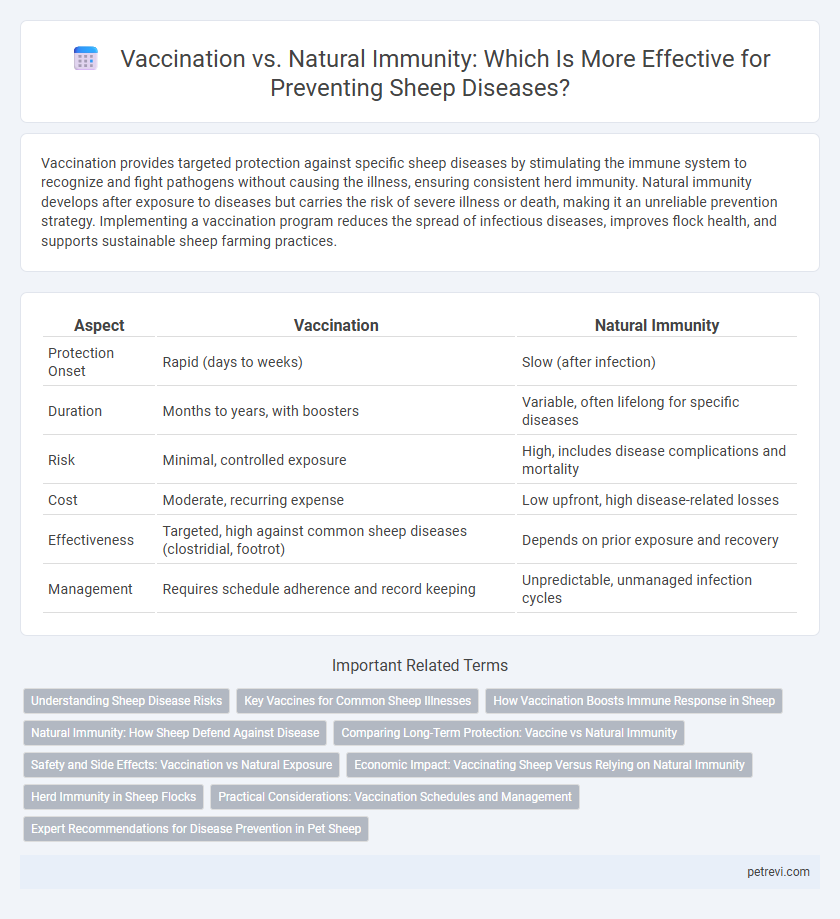Vaccination provides targeted protection against specific sheep diseases by stimulating the immune system to recognize and fight pathogens without causing the illness, ensuring consistent herd immunity. Natural immunity develops after exposure to diseases but carries the risk of severe illness or death, making it an unreliable prevention strategy. Implementing a vaccination program reduces the spread of infectious diseases, improves flock health, and supports sustainable sheep farming practices.
Table of Comparison
| Aspect | Vaccination | Natural Immunity |
|---|---|---|
| Protection Onset | Rapid (days to weeks) | Slow (after infection) |
| Duration | Months to years, with boosters | Variable, often lifelong for specific diseases |
| Risk | Minimal, controlled exposure | High, includes disease complications and mortality |
| Cost | Moderate, recurring expense | Low upfront, high disease-related losses |
| Effectiveness | Targeted, high against common sheep diseases (clostridial, footrot) | Depends on prior exposure and recovery |
| Management | Requires schedule adherence and record keeping | Unpredictable, unmanaged infection cycles |
Understanding Sheep Disease Risks
Sheep face significant disease risks including footrot, clostridial infections, and parasitic diseases, which can severely impact health and productivity. Vaccination provides targeted immunity against specific pathogens such as Clostridium perfringens types C and D and tetanus, reducing clinical outbreaks and mortality rates. Natural immunity develops through exposure but carries risks of severe illness and economic loss, making vaccination a safer and more effective prevention strategy in flock management.
Key Vaccines for Common Sheep Illnesses
Effective disease prevention in sheep relies on key vaccines targeting common illnesses such as clostridial diseases, including enterotoxemia and tetanus, alongside vaccines for footrot and pneumonia caused by Mannheimia haemolytica. Vaccination offers controlled immunity, providing reliable protection by stimulating the immune system without the risks of natural infection. Strategic vaccination programs combined with good management practices minimize disease outbreaks, ensuring flock health and productivity.
How Vaccination Boosts Immune Response in Sheep
Vaccination stimulates the sheep's immune system by introducing antigens that mimic disease-causing pathogens, prompting the production of specific antibodies and memory cells. This targeted immune activation enables quicker and more effective responses upon future exposure to the actual pathogens. Unlike natural infection, vaccination reduces disease severity and transmission risk while promoting herd immunity within the flock.
Natural Immunity: How Sheep Defend Against Disease
Natural immunity in sheep involves the activation of innate defense mechanisms such as physical barriers, phagocytic cells, and inflammatory responses that limit pathogen entry and proliferation. Adaptive immune responses, including the production of specific antibodies and memory cells, provide targeted protection against recurrent infections like foot rot and clostridial diseases. Strengthening natural immunity through proper nutrition, stress reduction, and environmental management enhances disease resistance and reduces reliance on vaccination.
Comparing Long-Term Protection: Vaccine vs Natural Immunity
Vaccination in sheep provides targeted immunity against specific diseases, often ensuring consistent and predictable long-term protection compared to natural infection. Natural immunity may result in variable defense effectiveness due to differences in pathogen exposure and individual immune responses. Studies indicate that vaccines stimulate both humoral and cellular immune responses, offering sustained protection that helps reduce disease outbreaks and mortality rates in sheep populations.
Safety and Side Effects: Vaccination vs Natural Exposure
Vaccination in sheep provides controlled immunity with minimal risk of severe side effects, as vaccines undergo rigorous safety testing to prevent adverse reactions. Natural exposure to diseases may lead to unpredictable health complications, including severe illness or death, due to the uncontrolled nature of infection. Vaccinated sheep benefit from reduced morbidity and mortality rates, ensuring flock health and productivity with fewer safety concerns compared to relying solely on natural immunity.
Economic Impact: Vaccinating Sheep Versus Relying on Natural Immunity
Vaccinating sheep significantly reduces the economic losses caused by disease outbreaks, including decreased mortality rates and improved weight gain, leading to higher market value. Relying solely on natural immunity often results in prolonged illness, increased veterinary costs, and production setbacks that negatively impact farm profitability. Strategic vaccination programs optimize overall flock health and generate a more reliable economic return on investment compared to the unpredictable outcomes of natural disease exposure.
Herd Immunity in Sheep Flocks
Vaccination in sheep flocks significantly enhances herd immunity by providing controlled exposure to pathogens, reducing the spread of infectious diseases such as footrot, clostridial infections, and ovine enzootic abortion. Natural immunity develops variably and slowly across the flock, often leaving vulnerable lambs and older ewes at higher risk of disease outbreaks. Strategic vaccination programs optimize flock health, improve resistance thresholds, and maintain productivity through consistent immune protection.
Practical Considerations: Vaccination Schedules and Management
Effective sheep disease prevention relies on well-planned vaccination schedules tailored to breed, age, and local disease prevalence. Timely administration of vaccines like clostridial and pneumonia vaccines enhances immunity more predictably than natural exposure, reducing morbidity and mortality rates. Proper management, including maintaining accurate records and ensuring booster doses, maximizes vaccine efficacy and supports flock health sustainability.
Expert Recommendations for Disease Prevention in Pet Sheep
Vaccination remains the most reliable method for preventing common sheep diseases such as clostridial infections and footrot, according to veterinary experts specializing in ovine health. Natural immunity may develop after exposure, but relying solely on it risks severe outbreaks and higher mortality rates in pet sheep populations. Expert guidelines emphasize regular vaccination schedules combined with robust biosecurity measures to ensure optimal disease prevention and long-term flock health.
Vaccination vs Natural Immunity for Sheep Disease Prevention Infographic

 petrevi.com
petrevi.com